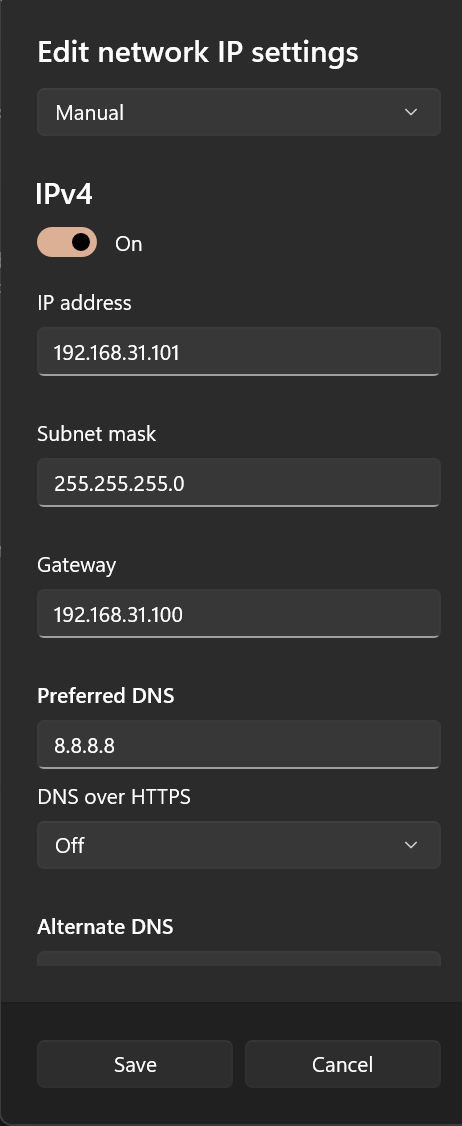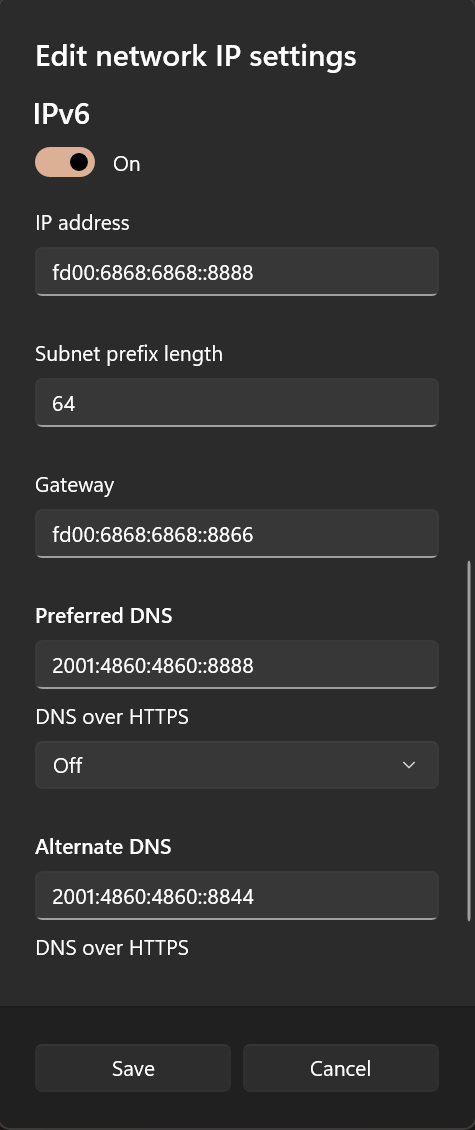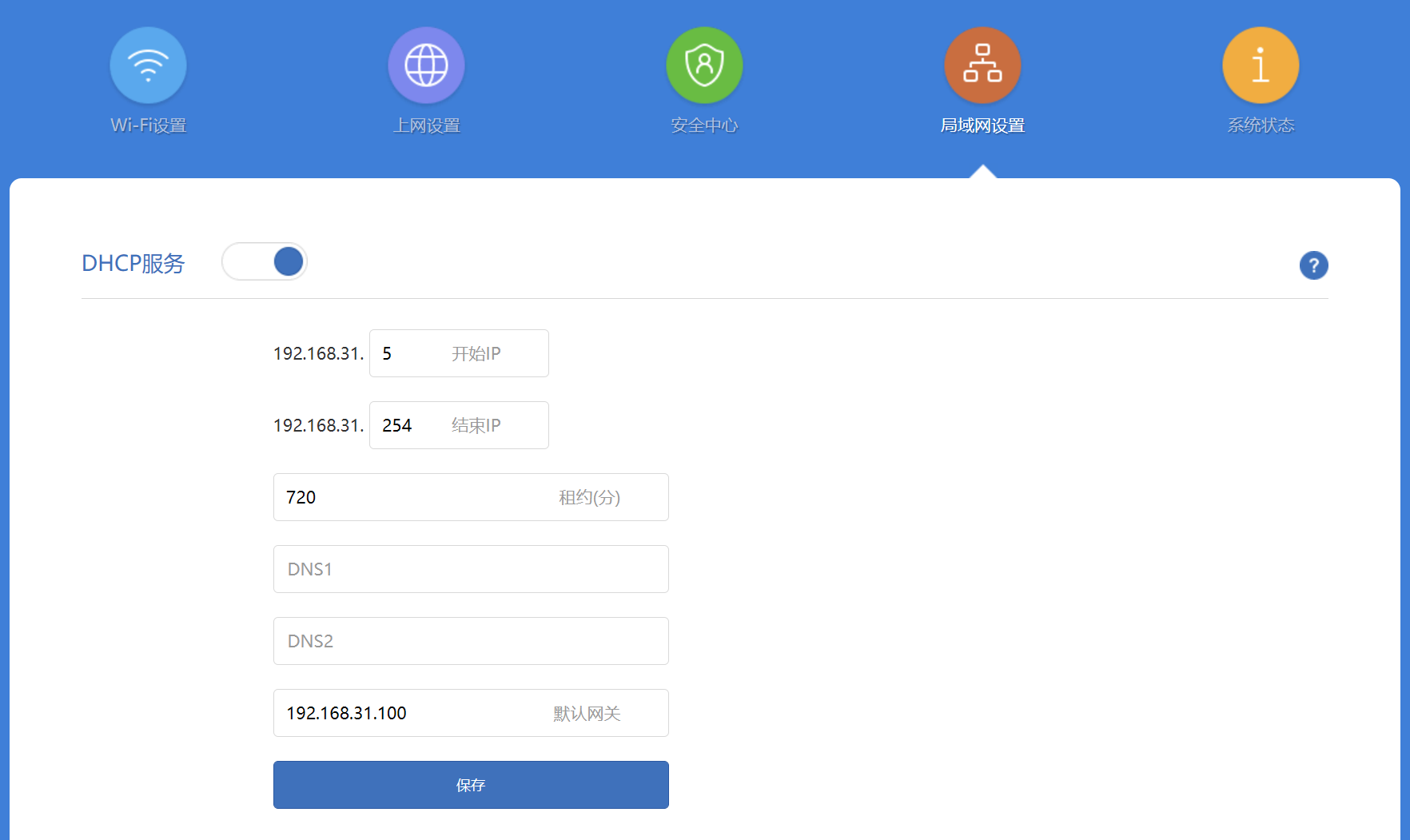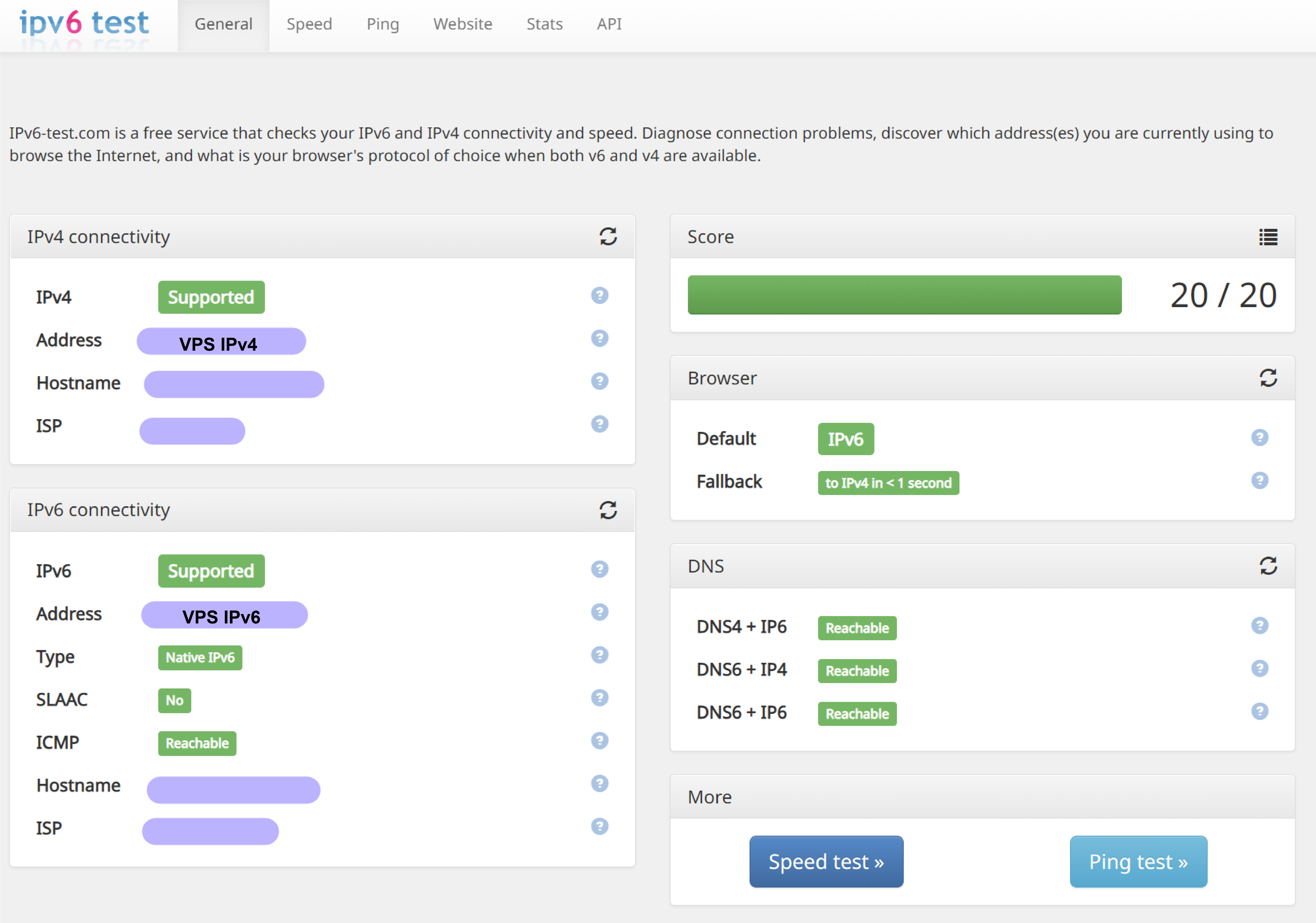21 KiB
| title |
|---|
| TProxy 透明代理 (ipv4 and ipv6) |
TProxy 透明代理(ipv4 and ipv6)配置教程
本配置参考了TProxy 透明代理的新 V2Ray 白话文教程,透明代理(TProxy)配置教程以及透明代理通过 gid 规避 Xray 流量,加入了透明代理对 ipv6 的支持,并且使用 VLESS-TCP-XTLS-RPRX-Vision 方案对抗封锁。
关于 Xray 的配置并不是本文重点,使用者可依实际情况进行修改,具体可以参考官方文档示例或其他优秀示例 比如@chika0801 又如@lxhao61。
::: warning 注意
若使用其他配置,你需要着重注意客户端配置中 outbound 中tag 为 proxy 的部分,其他部分不变
服务端配置也要同时改变 :::
此配置意在解决例如 Netflix 等默认使用 ipv6 连接的网站无法通过旁路由进行代理的问题,或对 ipv6 代理有需要。
本文网络结构为单臂旁路由
本文中所有配置已在 Arch Linux (Kernel: 6.0.10) 环境下测试成功,如在其它环境中同理
注意安装相应程序 # sudo apt install iptables ip6tables 或 # sudo apt install nftables。
Xray 配置
客户端配置
客户端配置可选则使用 fakedns,也可以选择不使用 fakedns 配置,二选一
::: tip 透明代理中的 fakedns
在旁路由的透明代理中,使用 fakedns 配合 routeOnly 以及 domainSrategy 为 AsIs 时,可最大程度降低访问延迟,详见文档入站代理
关于 fakedns 相关内容可参阅官方文档
:::
{
"log": {
"loglevel": "warning"
},
"inbounds": [
{
"tag": "all-in",
"port": 12345,
"protocol": "dokodemo-door",
"settings": {
"network": "tcp,udp",
"followRedirect": true
},
"sniffing": {
"enabled": true,
"destOverride": ["fakedns", "http", "tls"],
"metadataOnly": false,
"routeOnly": true
},
"streamSettings": {
"sockopt": {
"tproxy": "tproxy",
"mark": 255
}
}
}
],
"outbounds": [
{
//此为默认outbound,路由(routing)模块若未匹配到任何规则,则默认走此 proxy 出口,如果你希望直连国内优先请将下面 direct 出口放到 outbound 第一,看不懂可忽略
"tag": "proxy",
"protocol": "vless",
"settings": {
"vnext": [
{
"address": "yourdomain.domain", //改为你自己的域名,直接填写ipv4或ipv6地址也可以
"port": 443,
"users": [
{
"id": "uuid", //填写uuid,可通过在终端中输入 xray uuid 生成;此处也支持任意字符串(https://xtls.github.io/config/inbounds/vless.html#clientobject)
"encryption": "none",
"flow": "xtls-rprx-vision"
}
]
}
]
},
"streamSettings": {
"sockopt": {
"mark": 255
},
"network": "tcp",
"security": "tls", //注意使用 xtls-rprx-vision 流控此处需为 tls
"tlsSettings": {
//注意使用 xtls-rprx-vision 流控此处需为 tlsSettings
"allowInsecure": false,
"serverName": "yourdomain.domain", //改为你自己的域名
"fingerprint": "chrome" //模拟TLS Client Hello指纹,可选 chrome, firefox, safari, randomized, 具体参考 https://xtls.github.io/config/transport.html#tlsobject
}
}
},
{
"tag": "direct",
"protocol": "freedom",
"settings": {
"domainStrategy": "UseIP"
},
"streamSettings": {
"sockopt": {
"mark": 255
}
}
},
{
"tag": "block",
"protocol": "blackhole",
"settings": {
"response": {
"type": "http"
}
}
},
{
"tag": "dns-out",
"protocol": "dns",
"streamSettings": {
"sockopt": {
"mark": 255
}
}
}
],
"dns": {
"hosts": {
"填你VPS的域名": "填你VPS的ipv4或ipv6"
},
"servers": ["fakedns"]
},
"routing": {
"domainMatcher": "mph",
"domainStrategy": "AsIs",
"rules": [
{
"type": "field",
"inboundTag": ["all-in"],
"port": 53,
"network": "udp",
"outboundTag": "dns-out"
},
{
"type": "field",
"inboundTag": ["all-in"],
"port": 123,
"network": "udp",
"outboundTag": "direct"
},
{
"type": "field",
"domain": ["geosite:cn"],
"outboundTag": "direct"
},
{
"type": "field",
"domain": ["geosite:geolocation-!cn"],
"outboundTag": "proxy"
},
{
"type": "field",
"domain": ["geosite:category-ads-all"],
"outboundTag": "block"
},
{
"type": "field",
"protocol": ["bittorrent"],
"outboundTag": "direct"
},
{
"type": "field",
"ip": ["geoip:private", "geoip:cn"],
"outboundTag": "direct"
}
]
}
}
{
"log": {
"loglevel": "warning"
},
"inbounds": [
{
"tag": "all-in",
"port": 12345,
"protocol": "dokodemo-door",
"settings": {
"network": "tcp,udp",
"followRedirect": true
},
"sniffing": {
"enabled": true,
"destOverride": ["http", "tls"]
},
"streamSettings": {
"sockopt": {
"tproxy": "tproxy",
"mark": 255
}
}
}
],
"outbounds": [
{
//此为默认outbound,路由(routing)模块若未匹配到任何规则,则默认走此 proxy 出口,如果你希望直连国内优先请将下面 direct 出口放到 outbound 第一,看不懂可忽略
"tag": "proxy",
"protocol": "vless",
"settings": {
"vnext": [
{
"address": "yourdomain.domain", //改为你自己的域名,直接填写ipv4或ipv6地址也可以
"port": 443,
"users": [
{
"id": "uuid", //填写uuid,可通过在终端中输入 xray uuid 生成;此处也支持任意字符串(https://xtls.github.io/config/inbounds/vless.html#clientobject)
"encryption": "none",
"flow": "xtls-rprx-vision"
}
]
}
]
},
"streamSettings": {
"sockopt": {
"mark": 255
},
"network": "tcp",
"security": "tls", //注意使用 xtls-rprx-vision 流控此处需为 tls
"tlsSettings": {
//注意使用 xtls-rprx-vision 流控此处需为 tlsSettings
"allowInsecure": false,
"serverName": "yourdomain.domain", //改为你自己的域名
"fingerprint": "chrome" //模拟TLS Client Hello指纹,可选 chrome, firefox, safari, randomized, 具体参考 https://xtls.github.io/config/transport.html#tlsobject
}
}
},
{
"tag": "direct",
"protocol": "freedom",
"settings": {
"domainStrategy": "UseIP"
},
"streamSettings": {
"sockopt": {
"mark": 255
}
}
},
{
"tag": "block",
"protocol": "blackhole",
"settings": {
"response": {
"type": "http"
}
}
},
{
"tag": "dns-out",
"protocol": "dns",
"streamSettings": {
"sockopt": {
"mark": 255
}
}
}
],
"dns": {
"servers": [
{
"address": "223.5.5.5",
"port": 53,
"domains": [
"geosite:cn",
"ntp.org",
"yourdomain.domain" //改为你自己的域名
]
},
{
"address": "114.114.114.114",
"port": 53,
"domains": [
"geosite:cn",
"ntp.org",
"yourdomain.domain" //改为你自己的域名
]
},
{
"address": "8.8.8.8",
"port": 53,
"domains": ["geosite:geolocation-!cn"]
},
{
"address": "1.1.1.1",
"port": 53,
"domains": ["geosite:geolocation-!cn"]
}
]
},
"routing": {
"domainMatcher": "mph",
"domainStrategy": "IPIfNotMatch",
"rules": [
{
"type": "field",
"inboundTag": ["all-in"],
"port": 53,
"network": "udp",
"outboundTag": "dns-out"
},
{
"type": "field",
"inboundTag": ["all-in"],
"port": 123,
"network": "udp",
"outboundTag": "direct"
},
{
"type": "field",
"ip": ["223.5.5.5", "114.114.114.114"],
"outboundTag": "direct"
},
{
"type": "field",
"ip": ["8.8.8.8", "1.1.1.1"],
"outboundTag": "proxy"
},
{
"type": "field",
"domain": ["geosite:category-ads-all"],
"outboundTag": "block"
},
{
"type": "field",
"protocol": ["bittorrent"],
"outboundTag": "direct"
},
{
"type": "field",
"ip": ["geoip:private", "geoip:cn"],
"outboundTag": "direct"
},
{
"type": "field",
"domain": ["geosite:cn"],
"outboundTag": "direct"
}
]
}
}
服务端配置
{
"log": {
"loglevel": "warning"
},
"routing": {
"domainStrategy": "IPIfNonMatch",
"rules": [
{
//阻止 cnip 提高安全性,或者可以将 cn 流量导入 warp 中,详见https://xtls.github.io/document/level-2/warp.html
"type": "field",
"ip": ["geoip:cn"],
"outboundTag": "block"
}
]
},
"inbounds": [
{
"port": 443,
"protocol": "vless",
"settings": {
"clients": [
{
"id": "uuid", //与客户端相同
"flow": "xtls-rprx-vision"
}
],
"decryption": "none"
},
"streamSettings": {
"network": "tcp",
"security": "tls",
"tlsSettings": {
"certificates": [
{
"certificateFile": "/etc/ssl/private/fullchain.crt",
"keyFile": "/etc/ssl/private/crt.key" //参照小小白话文将生成的 fullchain.crt 以及 cert.key证书的路径相应填于此处(https://xtls.github.io/document/level-0/ch06-certificates.html#_6-4-%E6%AD%A3%E5%BC%8F%E8%AF%81%E4%B9%A6%E7%94%B3%E8%AF%B7)
}
]
}
},
"sniffing": {
"enabled": true,
"destOverride": ["http", "tls"]
}
}
],
"outbounds": [
{
"protocol": "freedom",
"tag": "direct"
},
{
"protocol": "blackhole",
"tag": "block"
}
]
}
Netfilter 配置
::: warning 注意
nftables 配置与 iptables 配置二选一,不可同时使用。 :::
使用 iptables
此处配置将 ipv4 与 ipv6 写在同一文件中。
# 设置策略路由 v4
ip rule add fwmark 1 table 100
ip route add local 0.0.0.0/0 dev lo table 100
# 设置策略路由 v6
ip -6 rule add fwmark 1 table 106
ip -6 route add local ::/0 dev lo table 106
# 直连从主路由发出
ip route add default via 192.168.31.1 #写主路由 ipv4, 采用局域网设备上网设置方法一可不写此命令
ip -6 route add default via fd00:6868:6868::1 #写主路由 ipv6, 采用局域网设备上网设置方法一可不写此命令
# 代理局域网设备 v4
iptables -t mangle -N XRAY
iptables -t mangle -A XRAY -d 127.0.0.1/32 -j RETURN
iptables -t mangle -A XRAY -d 224.0.0.0/4 -j RETURN
iptables -t mangle -A XRAY -d 255.255.255.255/32 -j RETURN
iptables -t mangle -A XRAY -d 192.168.0.0/16 -p tcp -j RETURN
iptables -t mangle -A XRAY -d 192.168.0.0/16 -p udp ! --dport 53 -j RETURN
iptables -t mangle -A XRAY -j RETURN -m mark --mark 0xff
iptables -t mangle -A XRAY -p udp -j TPROXY --on-port 12345 --tproxy-mark 1
iptables -t mangle -A XRAY -p tcp -j TPROXY --on-port 12345 --tproxy-mark 1
iptables -t mangle -A PREROUTING -j XRAY
# 代理局域网设备 v6
ip6tables -t mangle -N XRAY6
ip6tables -t mangle -A XRAY6 -d ::1/128 -j RETURN
ip6tables -t mangle -A XRAY6 -d fe80::/10 -j RETURN
ip6tables -t mangle -A XRAY6 -d fd00::/8 -p tcp -j RETURN
ip6tables -t mangle -A XRAY6 -d fd00::/8 -p udp ! --dport 53 -j RETURN
ip6tables -t mangle -A XRAY6 -j RETURN -m mark --mark 0xff
ip6tables -t mangle -A XRAY6 -p udp -j TPROXY --on-port 12345 --tproxy-mark 1
ip6tables -t mangle -A XRAY6 -p tcp -j TPROXY --on-port 12345 --tproxy-mark 1
ip6tables -t mangle -A PREROUTING -j XRAY6
# 代理网关本机 v4
iptables -t mangle -N XRAY_MASK
iptables -t mangle -A XRAY_MASK -d 224.0.0.0/4 -j RETURN
iptables -t mangle -A XRAY_MASK -d 255.255.255.255/32 -j RETURN
iptables -t mangle -A XRAY_MASK -d 192.168.0.0/16 -p tcp -j RETURN
iptables -t mangle -A XRAY_MASK -d 192.168.0.0/16 -p udp ! --dport 53 -j RETURN
iptables -t mangle -A XRAY_MASK -j RETURN -m mark --mark 0xff
iptables -t mangle -A XRAY_MASK -p udp -j MARK --set-mark 1
iptables -t mangle -A XRAY_MASK -p tcp -j MARK --set-mark 1
iptables -t mangle -A OUTPUT -j XRAY_MASK
# 代理网关本机 v6
ip6tables -t mangle -N XRAY6_MASK
ip6tables -t mangle -A XRAY6_MASK -d fe80::/10 -j RETURN
ip6tables -t mangle -A XRAY6_MASK -d fd00::/8 -p tcp -j RETURN
ip6tables -t mangle -A XRAY6_MASK -d fd00::/8 -p udp ! --dport 53 -j RETURN
ip6tables -t mangle -A XRAY6_MASK -j RETURN -m mark --mark 0xff
ip6tables -t mangle -A XRAY6_MASK -p udp -j MARK --set-mark 1
ip6tables -t mangle -A XRAY6_MASK -p tcp -j MARK --set-mark 1
ip6tables -t mangle -A OUTPUT -j XRAY6_MASK
# 新建 DIVERT 规则,避免已有连接的包二次通过 TPROXY,理论上有一定的性能提升 v4
iptables -t mangle -N DIVERT
iptables -t mangle -A DIVERT -j MARK --set-mark 1
iptables -t mangle -A DIVERT -j ACCEPT
iptables -t mangle -I PREROUTING -p tcp -m socket -j DIVERT
# 新建 DIVERT 规则,避免已有连接的包二次通过 TPROXY,理论上有一定的性能提升 v6
ip6tables -t mangle -N DIVERT
ip6tables -t mangle -A DIVERT -j MARK --set-mark 1
ip6tables -t mangle -A DIVERT -j ACCEPT
ip6tables -t mangle -I PREROUTING -p tcp -m socket -j DIVERT
::: tip 使用方法
将上述配置写入一个文件(如 iptables.rules),之后将该文件赋予可执行权限# chmod 700 ./iptables.rules
最后使用 root 权限执行该文件即可:# ./iptables.rules或# source iptables.rules。
:::
使用 nftables
首先设置策略路由
# 设置策略路由 v4
ip rule add fwmark 1 table 100
ip route add local 0.0.0.0/0 dev lo table 100
# 设置策略路由 v6
ip -6 rule add fwmark 1 table 106
ip -6 route add local ::/0 dev lo table 106
# 直连从主路由发出
ip route add default via 192.168.31.1 #写主路由 ipv4, 采用局域网设备上网设置方法一可不写此命令
ip -6 route add default via fd00:6868:6868::1 #写主路由 ipv6, 采用局域网设备上网设置方法一可不写此命令
::: tip 使用方法
直接将命令复制到旁路由终端 :::
然后配置 nftables
此处合并 ipv4 与 ipv6
#!/usr/sbin/nft -f
flush ruleset
table inet xray {
chain prerouting {
type filter hook prerouting priority filter; policy accept;
ip daddr { 127.0.0.0/8, 224.0.0.0/4, 255.255.255.255 } return
meta l4proto tcp ip daddr 192.168.0.0/16 return
ip daddr 192.168.0.0/16 udp dport != 53 return
ip6 daddr { ::1, fe80::/10 } return
meta l4proto tcp ip6 daddr fd00::/8 return
ip6 daddr fd00::/8 udp dport != 53 return
meta mark 0x000000ff return
meta l4proto { tcp, udp } meta mark set 0x00000001 tproxy ip to 127.0.0.1:12345 accept
meta l4proto { tcp, udp } meta mark set 0x00000001 tproxy ip6 to [::1]:12345 accept
}
chain output {
type route hook output priority filter; policy accept;
ip daddr { 127.0.0.0/8, 224.0.0.0/4, 255.255.255.255 } return
meta l4proto tcp ip daddr 192.168.0.0/16 return
ip daddr 192.168.0.0/16 udp dport != 53 return
ip6 daddr { ::1, fe80::/10 } return
meta l4proto tcp ip6 daddr fd00::/8 return
ip6 daddr fd00::/8 udp dport != 53 return
meta mark 0x000000ff return
meta l4proto { tcp, udp } meta mark set 0x00000001 accept
}
chain divert {
type filter hook prerouting priority mangle; policy accept;
meta l4proto tcp socket transparent 1 meta mark set 0x00000001 accept
}
}
::: tip 使用方法
将上述配置写入一个文件(如 nftables.rules),之后将该文件赋予可执行权限# chmod 700 ./nftables.rules
最后使用 root 权限执行该文件即可:# ./nftables.rules或# source nftables.rules
:::
::: tip 关于直连从主路由发出
在旁路由使用命令ip route show,如果使用下属方法一,则default via后应是主路由 ip,无需更改;如使用下述方法二,则default via后应是旁路由 ip,此时直连网站 DNS 解析会回环,造成直连网站无法访问,因此需指定为主路由 ip。
:::
::: tip 使用方法
若需要开机启动请参考 TProxy 透明代理的新 V2Ray 白话文教程 以及 透明代理(TProxy)配置教程 :::
其中,网关地址192.168.0.0/16, fd00::/8等可由ip address | grep -w inet | awk '{print $2}'以及ip address | grep -w inet6 | awk '{print $2}'获得
或者在 windows 网络设置中查看。
又或者在路由器“上网设置”中查看。
如果前缀192.168, fd00:相同可不更改,若不同如 fc00:, fd00: 等则更改为相应值,写法可通过 Goolge 搜索得到如 fc00::/7, fd00::/8。
局域网设备上网设置
此处假定旁路由 ipv4, ipv6 地址分别为192.168.31.100, fd00:6868:6868::8866, 旁路由的 ipv4, ipv6 地址可由命令ip add获得。
方法一
局域网设备上网有两种方式,第一种就是在使用设备上进行静态 IP 的配置,将网关指向旁路由 IP。但注意绝大部分手机不支持 ipv6 的静态 ipv6 配置,除非 root 后进行相关设置。
以 windows 设备为例,可以先开启 DHCP 记录自动分配的 IP 以参考,然后手写静态配置。
::: tip DNS 设置
此配置劫持 DNS 流量,DNS 可以随便写 :::


方法二
局域网设备上网的第二种方式,是在路由器上进行网关设置,这种方法对于连接到此路由器的设备无需做任何设置即可科学上网,但注意有些路由器不支持 ipv6 的网关设置,有 ipv6 需求的设备仍需在所需设备上单独手动配置 ipv6 相关设置参考方法一。

Finally
按照以上方法设置后设备即可双栈访问,进入测试网站比如 https://ipv6-test.com/ 可以看到如下结果

写在最后
如今 ipv6 并未完全普及,我们日常访问的流量 99%仍为 ipv4 流量;很多 VPS 商家虽然提供 ipv6 地址,但线路优化非常垃圾,甚至处于不可用状态,为何要加入 ipV6 的设置?
可以看到目前 ipv6 处于很尴尬的境地,各种设备对于 ipv6 的支持很烂,但是都在逐步完善,同时 Windows 系统对于 ipv6 的优先级也在提高,很多浏览器也会优先进行 ipv6 的解析以及访问,很多网站也开始默认使用 ipv6 进行访问(比如 Netflix, 如果没有配置 ipv6, 浏览器打开 Netflix 会显示 Not Available 是因为没有代理 Netflix 的 ipv6 请求,当然可以选择禁用 Windows 的 ipv6,但支持 ipv6 的 pt 站就无法使用)
这种情况下 ipv4 无法完全胜任网络冲浪的需求,即使是那 1%的流量,遇到了也会让人头疼不已。
而可以预见 ipv6 也会逐步与 ipv4 分庭抗礼,所以有必要加入 ipV6 的设置。